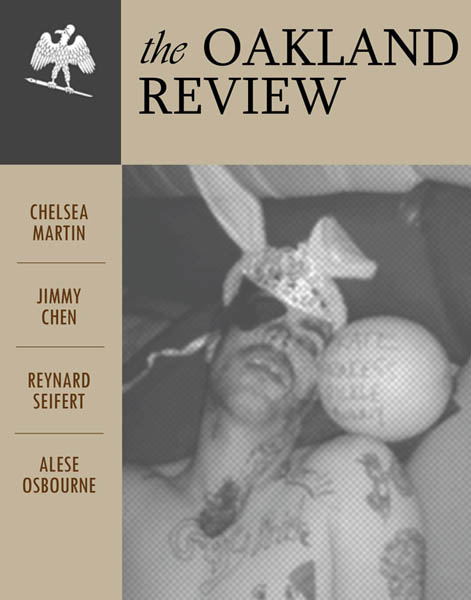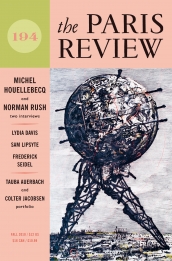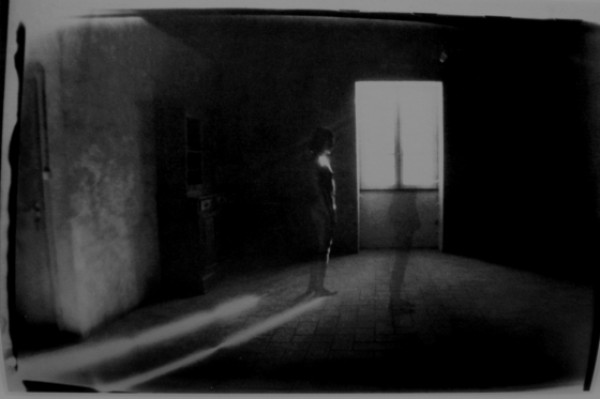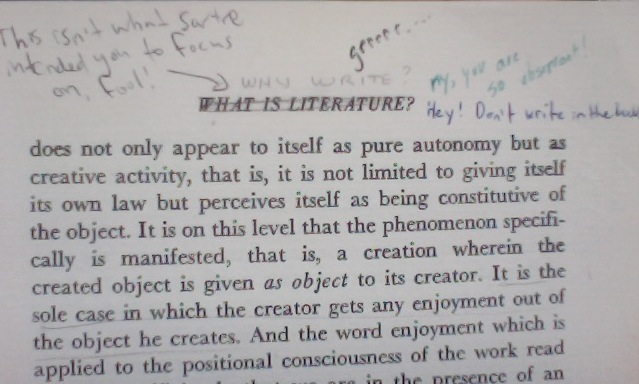How do million dollar math prizes, kids with semi-automatics, a wine bottle full of ocean water, and a sculptor’s pet raven raise themselves in unison? In Werner Herzog’s eloquent and stirring remarks on sublimity is how.
{Today} in Class: Micro-Reviews

So, for weeks now I’ve been promising excerpts reviews of contemporary poetry books and lit mags by students in my Deeper Poetics class. I’m consistently surprised and delighted by what they’re up to. Here are a few snippets:
Helena B. on Darcie Dennigan’s Corinna A-Maying the Apocalypse (Fordham U. Press, 2008)
Dennigan’s book doesn’t have anything so cheap as a moral. But in the crystalline strangeness and unfamiliar beauty of all of the poems; in the relationship between the poet and a young child (who may, in fact, be the child-self of the speaker herself) who each need the other desperately, and who agree to last; in the speaker’s wry and insistent and self-deprecating self-awareness (that can be found in nearly every poem but is most noticeable in “Eleven Thousand and One” and “Interior Ghazal of a Lousy Girl”) is some reassurance: that the world has already ended, that the world is always ending, and that we are still here. This is the kind of book that ruins me for doomsdays scenarios. May the ending of the world be half this beautiful.
Brandon V. on Lisa Jarnot’s Night Scenes (Flood Editions, 2008)
Lisa Jarnot’s Night Scenes begins with an epigraph out of Robert Duncan:
O, to release the first music somewhere again,
for a moment
to touch the design of the first melody!
Night Scenes is aptly preluded: sound and meter govern the poems in this collection. Jarnot pens the lyric—through implicit in the lyric poem is the myth of the proto-lyricist and first poet, Orpheus, and his songs of loss. Jarnot crafts scenes of sprawling fields and forests restful and bucolic and bathed in stars; these scenes, however, are as a dream, sung from a distance, projected like moonlight onto the page from Jarnot’s ostensible (as first seen in the poem “Bar Course Excise Insensible”) home in Brooklyn. Night Scenes is a searching, a reaching for that lost first music—and Jarnot takes up the task jubilantly, finding her melody in the wonder of the sensuous natural world.
November 9th, 2010 / 4:52 pm
 Bay Area locals please join us at a reading in support of The Really Funny Thing About Apathy with our own Chelsea Martin, Reynard Seifert, and myself; and introducing Alese Osbourne, this Sunday November 14, 6 p.m., at Royal Nonesuch Gallery in Oakland, California.
Bay Area locals please join us at a reading in support of The Really Funny Thing About Apathy with our own Chelsea Martin, Reynard Seifert, and myself; and introducing Alese Osbourne, this Sunday November 14, 6 p.m., at Royal Nonesuch Gallery in Oakland, California.
The Paris Review #194
 During the great de-acceptance debacle of 2010 wherein Lorin Stein, the new editor of The Paris Review declined to publish a selection of previously accepted poetry, one of the tangents to the discussion, for me, was the nagging sense that we were all engaged in a fascinating, vigorous discussion about a magazine only a fraction of us actually read. If we, broadly speaking, were going to dissect the editorial decisions being made at a given magazine, I felt we should probably have a greater stake in the discussion than to simply say, “We are all writers; this affects us.” I can only speak for myself but The Paris Review was not on my regular reading rotation. I own that.
During the great de-acceptance debacle of 2010 wherein Lorin Stein, the new editor of The Paris Review declined to publish a selection of previously accepted poetry, one of the tangents to the discussion, for me, was the nagging sense that we were all engaged in a fascinating, vigorous discussion about a magazine only a fraction of us actually read. If we, broadly speaking, were going to dissect the editorial decisions being made at a given magazine, I felt we should probably have a greater stake in the discussion than to simply say, “We are all writers; this affects us.” I can only speak for myself but The Paris Review was not on my regular reading rotation. I own that.
The Paris Review is big and as a side note, the spine margin is wide enough to keep the magazine readable (they heard you, Blake). The Paris Review is expensive. I was pretty angry about the price, not for the magazine, but for shipping. $5.95? Really? The shipping is a touch less than half the price of the magazine. I’m cheap. They’re rich. It’s one thing for a tiny magazine to charge $5.95 but can’t TPR break us off a little something? It was frustrating. Yes, I devote mental energy to these sorts of things. The cover design is fine—it doesn’t rock my world but I don’t need it to. There’s a certain elegance and familiarity to the design—a patrician quality evoking visions of speaking in hushed tones in libraries with leather chairs and men smoking pipes. The interior design is, well, pretty terrible, but nobody’s perfect and there’s something to be said for a magazine that lets the writing do the talking instead of throwing their ability to use InDesign and Photoshop in your face at every opportunity. I had a good laugh when I saw a full color Chanel and Richard Anderson. In the Chanel ad, a barely pubescent girl with extremely dark eye makeup stares at you sullenly like she’s channeling Kristen Stewart or Taylor Momsen. The ads let you know, “Look—this magazine is for the wealthy or those who aspire to wealth.”
November 9th, 2010 / 3:00 pm
if some thing black: On Alix & Jacques Roubaud
Last week I read Dalkey Archive’s somewhat recent release, Alix’s Journal. It was written by Alix Cleo Roubaud, husband of the far-more-visible Jacques Roubaud. Immediately upon finishing Alix’s Journal, I read Jacques’s some thing black. Jacques was a poet, a mathematician, an eventual novelist, and a key player in the OuLiPo. Alix was never sure exactly what she was, other than Jacques wife–which she insisted on her role as with intensity. After Alix died, suddenly, in 1983 of a pulmonary embolism, Jacques began working on some thing black, which took its name from Alix’s series of photographic prints, if some thing black.
Both books, independently and intertextually, are fantastic works. But what becomes most interesting for me, perhaps, is the way in which the book interact. There seems to be a similar relationship between the books (the texts, the written words) as that between Jacques and Alix during their marriage. Alix’s Journal reveals a woman in a primarily male-dominated intellectual world. This is not academia, this is a realm of existence that I doubt still exists in the same way (though to be fair I live in a small town in Northern Illinois)– people, individuals, that care deeply about their own art and the art of others, with no specific ties to a University funding anybody’s motivations. A similar world is exposed in the first volume of Susan Sontag’s journals, and to be fair I can’t help but find it somewhat Utopian.
But this world is not at interest for the time being, because the world of the text that each book carries is one of sadness and desperation.
November 9th, 2010 / 2:38 pm
COOKS SOURCE EDITORIAL MEETING
Just when I thought I’d never watch another Downfall redub. The lovely thing about this, of course, is that it’s fair use.
After a long hiatus, my friend Bryan and I have gathered enough material for a nice few months of updates for our prayer narrative web journal, On Earth As It Is. First up, HTML Giant’s own Kyle Minor.
{LMC}: On Scott Garson’s Silt
Here is Garson’s Silt. If you would like to have the full PDF of NY Tyrant 8 so you can participate in this month’s LMC discussions, get in touch with me. But still, when you buy a literary magazine, an angel gets its wings so consider buying a copy.
I will not dishonor Scott Garson’s story by writing something longer than he did. There is no insightful analysis in my post, just appreciation. I read it many times, and that is the mark of good work that is so short. I will read it again many times.
My favorite bit: “… hummed in the jaundicing keys of tube lights.” Tube lights are the death of us all and the word jaundice makes me shiver.
SPOILER ALERT! Skip this paragraph if you have not read the piece yet … The end was also snazzy (snazzy is not the right word, but I just felt like saying that): “Were you not also looking to get solved?” Ah, yes, I was looking to get solved. Thank you.
So I do not gush too much, I have a serious problem with one thing. “Public relations specialist” should not be capped. It is an outrage. How dare you, sir.
I have no answers, only questions. Did anyone else enjoy this piece as much as I did? Elaborate. Share your favorite line. If not, why? And what’s up with that title?


